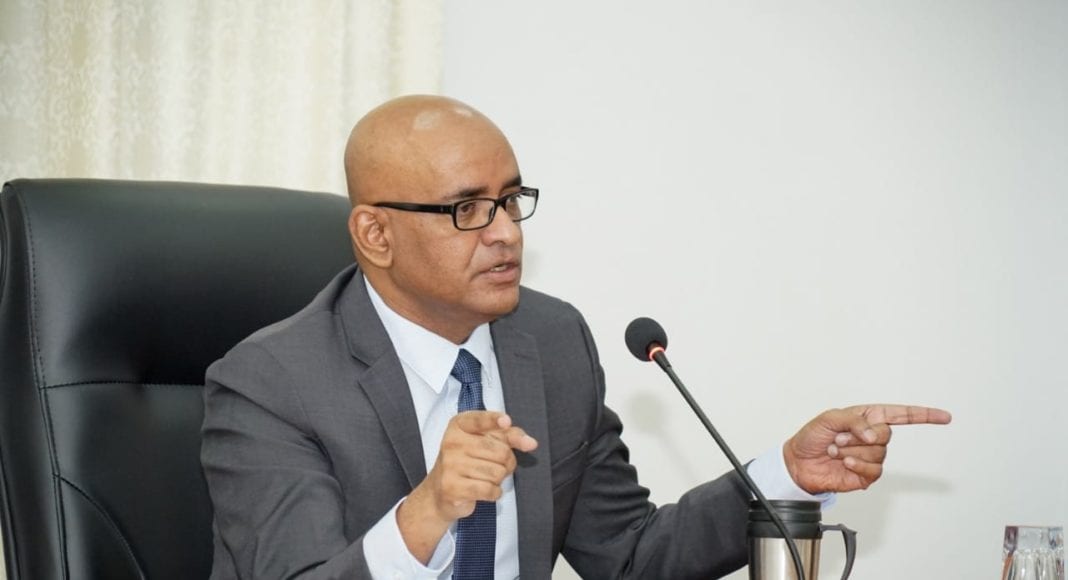While his counterparts in Trinidad and Tobago have taken umbrage at his latest public comments that the economy of the Twin-Island Republic is falling apart, Vice President, Dr. Bharrat Jagdeo has no intention to change his position. For him, it is an irrefutable fact which all are aware of.
Speaking to members of the local media corps last week, VP Jagdeo recalled the context of his statements about Trinidad which were initially made during his recent two-day trip to Essequibo. Mr. Jagdeo said Trinidad’s economy has been dependent on oil revenues for decades and in the past few years, due to the economic shocks that have hit the global markets along with the country’s declining production, the TT economy has been “falling apart.”
At the press conference, he said, “I have tracked what’s going on in Trinidad and Tobago for quite a while and what I said there (during the Essequibo trip) is not anything new. Every day it is being said in TT by common people as well as people in every circle, even the groups that come here from the private sector, they say this too. It is indisputable that its economy is heavily reliant on one sector, the oil and gas sector.”
The Vice President added, “I have had discussions with several leaders there about a post oil and gas economy so this has nothing to do with Prime Minister, Dr. Keith Rowley, this is a fact; the economy over a long period grew to be dependent on oil and the danger of the Dutch disease has been pointed out and, practically, it has consequences for your country, and we have seen it happen in TT…”
Given what has become of Trinidad and Tobago, and many other countries that became reliant on oil revenues, Mr. Jagdeo said the Guyana government is determined to ensure the country does not follow the same path.
He said it is a fact that people in TT are losing jobs because of the fallout, and the country is suffering from currency shortages.
“…So, what I am saying is not anything new… I don’t know if they have a problem with truth, but the fact of the matter is that the economy is undiversified and it relies heavily on oil and gas and when the prices fall, things start to fall apart and they are facing some of those consequences now.”
The latest Staff Report prepared by a team of the International Monetary Fund (IMF) for the Executive Board’s consideration on February 9, 2022, also highlights some of the troubling economic developments in the CARICOM State.
Before the COVID-19 pandemic, the IMF team said Trinidad and Tobago was recovering from a prolonged recession. During 2016–19, the officials said the economy experienced a deep recession driven by energy supply and price shocks, which weakened domestic demand and adversely impacted fiscal and external positions. Real Gross Domestic Product (GDP) growth was expected to turn positive in 2020 and pick up over the medium term, as energy projects came on stream and domestic demand recovery took hold. However, COVID-19, domestic supply shocks in the energy sector, and weak global demand derailed the incipient recovery.
Furthermore, the IMF team said stringent COVID-19 containment measures severely impacted non-energy domestic activity. The officials also noted that energy production declined significantly in 2020 and further in early 2021 due to unanticipated maintenance in some energy facilities and the closure of several petrochemical plants. Combined with weaker global demand and the drop in energy prices in 2020, these factors substantially lowered energy exports and fiscal revenues. The team outlined in their report that headline inflation fell while labour market conditions weakened considerably, causing an upsurge in retrenchments, temporary layoffs, and a reduction in working hours and labour force participation.
Additionally, the IMF team was keen to note that there is a need for TT officials to find the right balance for sustainable development and fiscal sustainability. “Given the economy’s dependency on fossil fuel exports and fiscal revenues from the energy sector, timing to implement structural changes will be vital to reduce commodity dependency. If the country waits for too long to start making substantive investments in technology and human capital development, it could lose the window of opportunity to establish comparative advantages in low-carbon sectors,” the report stated.
At the same time, the document stressed that allocating resources into sectors that will not be productive in the short-term could put fiscal sustainability at risk. Thus, the team noted that it will be essential for Trinidadian authorities to strike a balance between moving toward a greener economy and avoiding economic disruptions.



